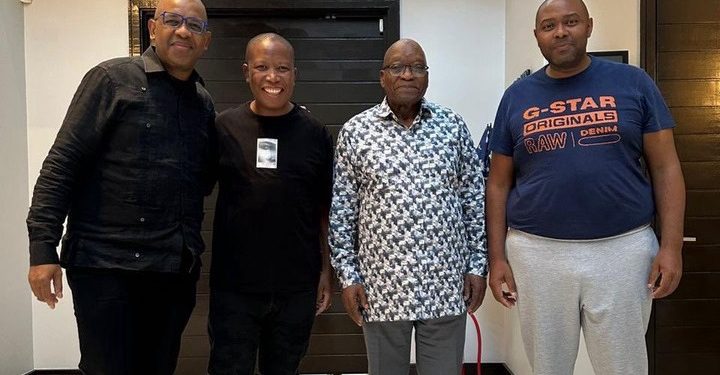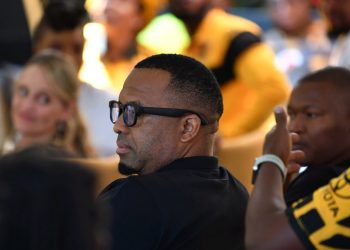A photo circulating online has ignited political intrigue, reportedly showing a meeting between former South African President Jacob Zuma, Economic Freedom Fighters (EFF) leader Julius Malema, advocate Dali Mpofu, and an unidentified individual. Accompanying the image is a claim that has fueled speculation: Malema allegedly ended discussions just 15 minutes in, rejecting Zuma’s proposal to merge the EFF with the newly formed uMkhonto weSizwe (MK) Party.
This alleged swift dismissal contrasts sharply with Zuma’s reputed negotiating style, where meetings often extended beyond two hours as he meticulously laid out his arguments. While the claim remains unverified, the suggestion that Malema outright dismissed the idea and cut the meeting short has stirred debate about the dynamics between the two political figures.
The context of this purported exchange lies in South Africa’s shifting political landscape. Zuma, once a prominent ANC leader before his departure, launched the MK Party in late 2023, positioning it as a rival to the ruling party he once led. Meanwhile, Malema—a former ANC Youth League president turned firebrand opposition leader—has long championed the EFF’s radical agenda, advocating for land expropriation and economic redistribution. A merger between the two could have signaled a major realignment of opposition forces, potentially challenging the ANC’s dominance. However, if the claims are true, the meeting’s abrupt end suggests Malema’s reluctance to entertain such an alliance, possibly due to ideological or strategic differences.
What makes this narrative particularly compelling is the implied clash in leadership styles. Zuma, known for his prolonged deliberations, appears to have met resistance from Malema’s decisive, no-nonsense approach. The allegation that Malema shut down discussions so quickly paints him as a leader unwilling to compromise his party’s identity or autonomy. Yet, without concrete evidence, this remains speculative political gossip—leaving observers to question the true nature of the exchange. Did Malema reject Zuma’s vision outright, or was his alleged refusal a strategic move to assert his own authority?
As the story circulates, it underscores the tensions and rivalries shaping South Africa’s opposition politics—where alliances are fragile, and every meeting holds the potential to reshape the battlefield.






















